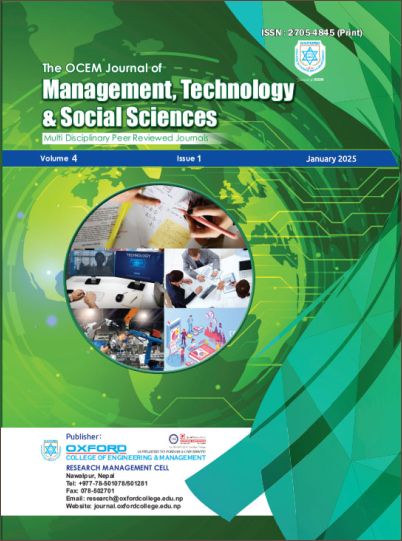Eco-Friendly Paver Block: Comparative Study by Composition Review
DOI:
https://doi.org/10.3126/ocemjmtss.v4i1.74757Keywords:
Non-degradable, Construction wastes, sustainability, strength, durabilityAbstract
Eco-friendly paver tiles are manufactured using environmentally nondegradable construction wastes, adhering to the “Recycle, Reuse, Reduce” principle. This study investigates the reuse of construction waste as costeffective engineering materials to foster sustainability, minimize environmental impact, and ensure long-term durability. By incorporating non-degradable materials like plastics and components of paver blocks, the research seeks to reduce concrete usage while improving architectural aesthetics, engineering functionality, and local market demand. Waste plastic and silica sand were evaluated for thermoplastic composites in floor tiles, assessed by water absorption and compressive strength tests. Key findings demonstrate that 100% recycled marble or porcelain aggregates enhance mortar’s mechanical and durability properties, while recycled coarse concrete aggregate replacements above 60% negatively affect strength and water absorption. Cement-concrete waste powders and alkali-activated construction and demolition wastes exhibit potential for reducing carbon footprints, promoting circular economies, and warrant further investigation into environmental and economic impacts. The inclusion of furnace slag (up to 40%) or glass powder (up to 30%) improves compressive and tensile strengths, affirming their eco-friendly applications.
Plastic waste, such as MPW and LDPE, shows promise in paver blocks, with compressive strengths supporting traffic scenarios using 10–50% plastic content. However, process optimization is required for viable end products. This study underscores the importance of resource recovery, reduced reliance on natural materials, and innovation in sustainable construction materials. Findings support greener development for low-load applications like walkways and streets, advancing environmental and economic sustainability in the construction sector. This study benefit to the new researcher to review the literature.
Downloads
Downloads
Published
How to Cite
Issue
Section
License
Copyright (c) 2025 Authors and OCEM Journal of Management, Technology & Social Sciences

This work is licensed under a Creative Commons Attribution-NonCommercial 4.0 International License.
This license enables reusers to distribute, remix, adapt, and build upon the material in any medium or format for noncommercial purposes only, and only so long as attribution is given to the creator.




